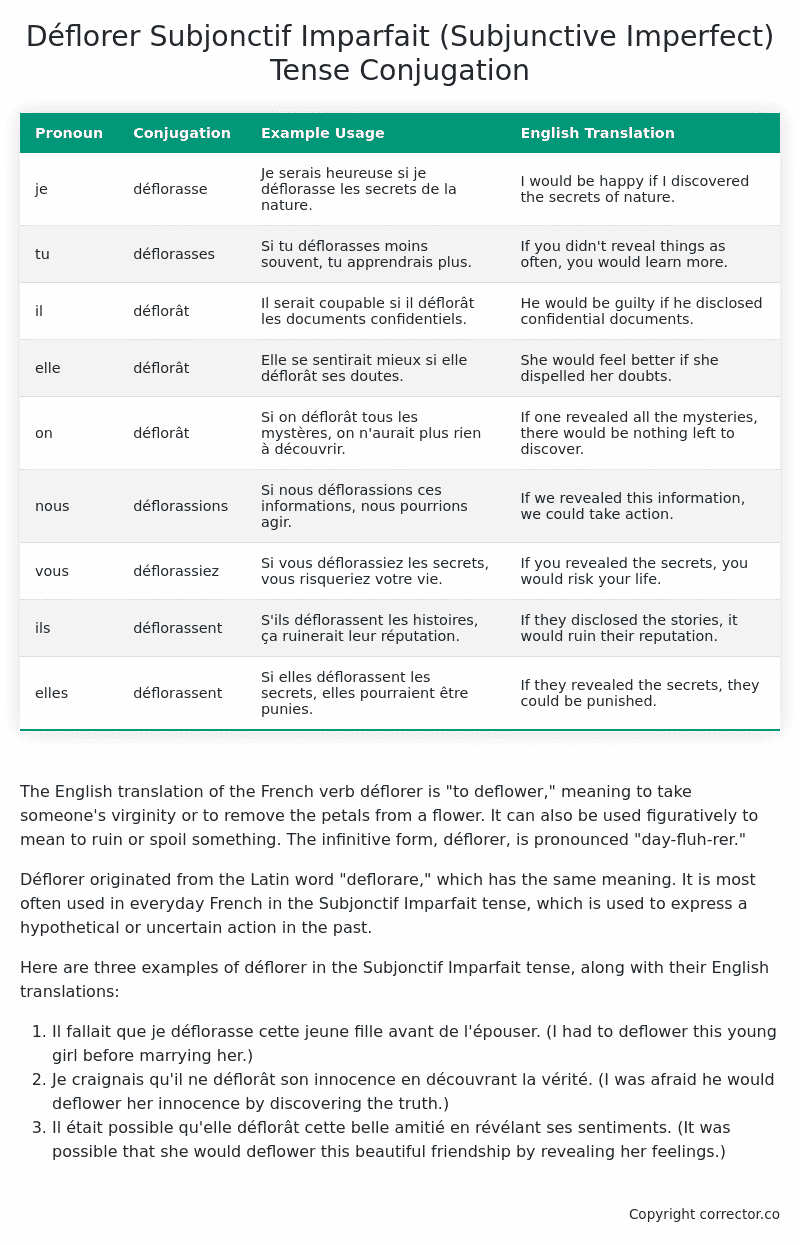Subjonctif Imparfait (Subjunctive Imperfect) Tense Conjugation of the French Verb déflorer
Introduction to the verb déflorer
The English translation of the French verb déflorer is “to deflower,” meaning to take someone’s virginity or to remove the petals from a flower. It can also be used figuratively to mean to ruin or spoil something. The infinitive form, déflorer, is pronounced “day-fluh-rer.”
Déflorer originated from the Latin word “deflorare,” which has the same meaning. It is most often used in everyday French in the Subjonctif Imparfait tense, which is used to express a hypothetical or uncertain action in the past.
Here are three examples of déflorer in the Subjonctif Imparfait tense, along with their English translations:
- Il fallait que je déflorasse cette jeune fille avant de l’épouser. (I had to deflower this young girl before marrying her.)
- Je craignais qu’il ne déflorât son innocence en découvrant la vérité. (I was afraid he would deflower her innocence by discovering the truth.)
- Il était possible qu’elle déflorât cette belle amitié en révélant ses sentiments. (It was possible that she would deflower this beautiful friendship by revealing her feelings.)
Table of the Subjonctif Imparfait (Subjunctive Imperfect) Tense Conjugation of déflorer
| Pronoun | Conjugation | Example Usage | English Translation |
|---|---|---|---|
| je | déflorasse | Je serais heureuse si je déflorasse les secrets de la nature. | I would be happy if I discovered the secrets of nature. |
| tu | déflorasses | Si tu déflorasses moins souvent, tu apprendrais plus. | If you didn’t reveal things as often, you would learn more. |
| il | déflorât | Il serait coupable si il déflorât les documents confidentiels. | He would be guilty if he disclosed confidential documents. |
| elle | déflorât | Elle se sentirait mieux si elle déflorât ses doutes. | She would feel better if she dispelled her doubts. |
| on | déflorât | Si on déflorât tous les mystères, on n’aurait plus rien à découvrir. | If one revealed all the mysteries, there would be nothing left to discover. |
| nous | déflorassions | Si nous déflorassions ces informations, nous pourrions agir. | If we revealed this information, we could take action. |
| vous | déflorassiez | Si vous déflorassiez les secrets, vous risqueriez votre vie. | If you revealed the secrets, you would risk your life. |
| ils | déflorassent | S’ils déflorassent les histoires, ça ruinerait leur réputation. | If they disclosed the stories, it would ruin their reputation. |
| elles | déflorassent | Si elles déflorassent les secrets, elles pourraient être punies. | If they revealed the secrets, they could be punished. |
Other Conjugations for Déflorer.
Le Present (Present Tense) Conjugation of the French Verb déflorer
Imparfait (Imperfect) Tense Conjugation of the French Verb déflorer
Passé Simple (Simple Past) Tense Conjugation of the French Verb déflorer
Passé Composé (Present Perfect) Tense Conjugation of the French Verb déflorer
Futur Simple (Simple Future) Tense Conjugation of the French Verb déflorer
Futur Proche (Near Future) Tense Conjugation of the French Verb déflorer
Plus-que-parfait (Pluperfect) Tense Conjugation of the French Verb déflorer
Passé Antérieur (Past Anterior) Tense Conjugation of the French Verb déflorer
Futur Antérieur (Future Anterior) Tense Conjugation of the French Verb déflorer
Subjonctif Présent (Subjunctive Present) Tense Conjugation of the French Verb déflorer
Subjonctif Passé (Subjunctive Past) Tense Conjugation of the French Verb déflorer
Subjonctif Imparfait (Subjunctive Imperfect) Tense Conjugation of the French Verb déflorer (this article)
Subjonctif Plus-que-parfait (Subjunctive Pluperfect) Tense Conjugation of the French Verb déflorer
Conditionnel Présent (Conditional Present) Tense Conjugation of the French Verb déflorer
Conditionnel Passé (Conditional Past) Tense Conjugation of the French Verb déflorer
L’impératif Présent (Imperative Present) Tense Conjugation of the French Verb déflorer
L’infinitif Présent (Infinitive Present) Tense Conjugation of the French Verb déflorer
Struggling with French verbs or the language in general? Why not use our free French Grammar Checker – no registration required!
Get a FREE Download Study Sheet of this Conjugation 🔥
Simply right click the image below, click “save image” and get your free reference for the déflorer Subjonctif Imparfait tense conjugation!

Déflorer – About the French Subjonctif Imparfait (Subjunctive Imperfect) Tense
Formation
Common Everyday Usage Patterns
Interactions with Other Tenses
Subjonctif Présent
Indicatif Passé Composé
Conditional
Conditional Perfect
Summary
I hope you enjoyed this article on the verb déflorer. Still in a learning mood? Check out another TOTALLY random French verb conjugation!


